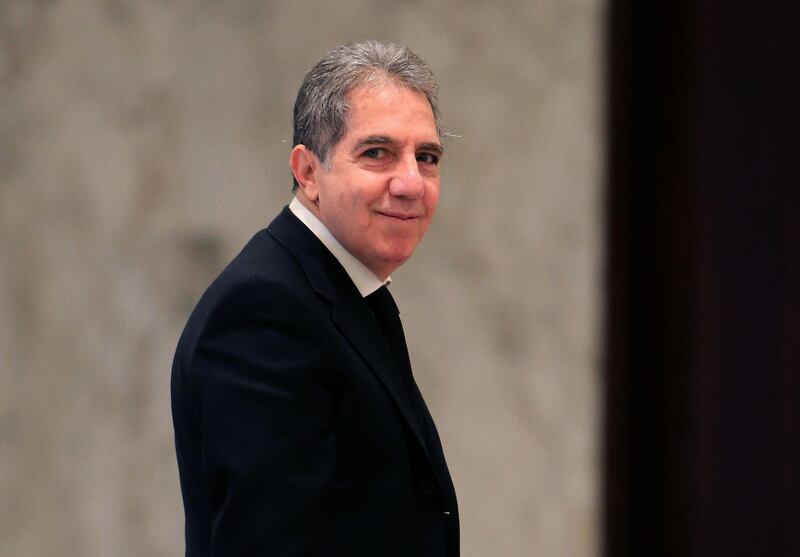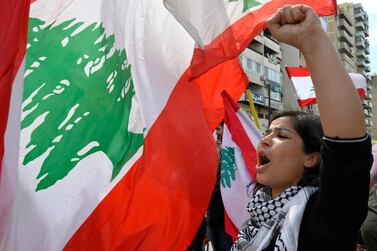Lebanon’s government plans to abandon the 23-year peg of its currency to the US dollar and gradually introduce a flexible exchange rate, as part of its plan to overhaul the economy and overcome its worst crisis in three decades, the finance minister said.
“Today is a day of national dialogue to talk about the financial recovery plan and it is a historic day for Lebanon, because the coming years will determine the fate of Lebanon’s economic future,” Ghazi Wazni said in speech at a meeting of heads of parliamentary blocs on Wednesday.
Mr Wazni said the government’s five-year economic rescue plan approved last week is underpinned by nine elements including the adoption of a “flexible exchange rate policy … in a gradual and studied manner.”
“Liberalisation of the exchange rate of the lira before restoring confidence, fortifying the economic and financial climate, and obtaining international support from the International Monetary
Fund and donor countries will lead to complete chaos of commodity prices, a significant deterioration of the exchange rate of the lira,” he said.
The government’s plan assumes an exchange rate that fixes the lira, also referred to as the pound, at 3,500 to the US dollar – more than double the peg that has existed since 1997. The currency has lost more than half of its value on the black market as the economic crisis in the country worsened over the past year.
"There are a lot of inconsistencies and ambiguous points in the plan to say the least," said Nassib Ghobril, chief economist at Byblos Bank. "But the good part is that negotiations hopefully will start soon with the IMF and that will determine what kind of exchange regime we will have."
Lebanon formally requested IMF assistance last week.
The recovery plan, Mr Wazni said was approved by the government as the country faced a dire situation and grim economic indicators that continue to deteriorate. In addition to the depreciation in the value of the currency, these include the economy contracting 13 per cent, inflation rising to above 50 per cent, an increase in the poverty rate to above 45 per cent, and unemployment to above 35 per cent, as well as a large fiscal deficit and unsustainable public debt, he said.
Lebanon's gross domestic product is set to contract 12 per cent this year, according to IMF projections. The country's debt ballooned to $92 billion (dh337.6bn) at the end of January, making it one of the highest debt-to-GDP ratios worldwide.
The government’s plan is “reformist, transparent and credible” he said and “is a way out of the crisis.”
“It provides for the first-time clear numbers of the accumulated losses, especially in the financial sector, with a precise determination of their distribution and their causes,” he added. “It aims to restore confidence, increase economic growth, promote a healthy financial system and achieve public financial sustainability in Lebanon.”
Following the government approval of the plan, the Association of Banks in Lebanon rejected the government's rescue plan and said it was "not consulted" by prime minister Hassan Diab's administration.
“The association is an essential part of any solution, as the economy requires a strong banking sector capable of playing its role as a means of social integration and growth by granting credit to individuals and companies,” ABL said, a day after the government submitted its request to the fund.
The government’s plan aims to reduce the deficit in the public budget to 5.3 per cent in 2020 from 11.3 per cent of GDP in 2019 and then to 0.7 per cent in 2024, Mr Wazni said. The government plans to achieve this by reducing spending which includes reforming its electricity sector that includes the state owned electricity company that saps about $2bn of government finances annually.
The government estimates its external financing needs in the 2020-2024 period at about $28bn and the rescue plan aims to secure support from multiple external sources, including $10bn from the IMF and $11bn pledged by international donors two years ago which is contingent on the implementation of reforms. The government’s plan also assumes financing from bilateral loans and grants.
The plan aims to reduce the public debt to 99 per cent of GDP by 2024 from 175 per cent in 2019, Mr Wazni said.
On Wednesday the country's Purchasing Manager's Index for the month of April pointed to a record deterioration in business conditions after dropping to 30.9 from 35 in March, according to the survey, sponsored by Blominvest Bank and compiled by IHS Markit.
The rate of contraction was the sharpest since data collection began seven years ago, eclipsing the previous record set in March.








